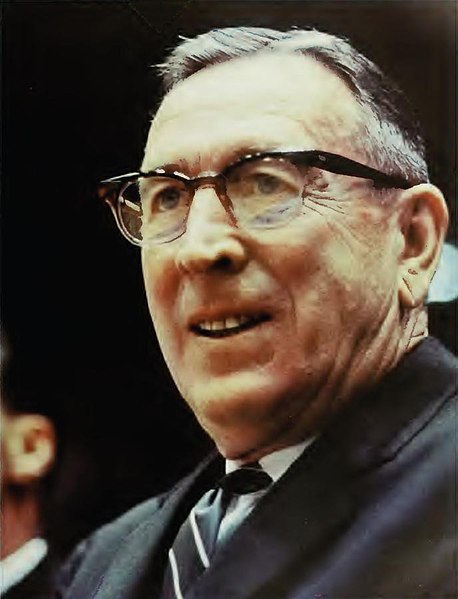John Wooden’s Wisdom: Navigating the Court of Leadership

Embarking on the Wooden Way: Unraveling a Unique Leadership Legacy
In the annals of leadership, certain individuals stand out, not just for their accomplishments, but for the lasting influence they have had on the lives of others and on the very definition of leadership itself. John Wooden, a legendary basketball coach, an insightful educator, and a transformational leader, is one such figure. He is frequently quoted, intensely studied, and widely admired for his unique philosophy of leadership. While primarily known for his phenomenal success as the head coach of the UCLA men’s basketball team, Wooden’s teachings extend far beyond the boundaries of sports, reaching into all facets of life, leadership, and human potential.
John Wooden was an ordinary man who accomplished extraordinary feats, not through magic or mystery, but through a systematic approach to leadership, integrity, and personal development that he wove into every interaction, every game, and every life he touched. His wisdom and principles have transcended the test of time, proving invaluable to leaders across a spectrum of professions, from business executives and educators to public servants and coaches. Through his life and work, Wooden provides a profound study in leadership, showcasing how to inspire individuals, build teams, and create a sustainable culture of excellence.
The true brilliance of Wooden’s leadership lies in his holistic approach. His philosophy was never confined merely to winning games, although he won many, setting records that stand to this day. Rather, his focus was on building character, instilling ethical values, fostering teamwork, and nurturing a relentless pursuit of personal and collective bests. He viewed success not as the outcome of competition, but as the peace of mind achieved through the self-satisfaction of knowing one has made the effort to do their best.
As we embark on this exploration of John Wooden’s leadership legacy, it is not merely to revisit the glory days of a basketball legend or to marvel at a pyramid diagram. Our objective is much more profound: to delve into the mindset, values, and principles that made Wooden an exceptional leader. To understand how his vision, humility, tenacity, and love for his team crafted one of the most impressive dynasties in sports history.
We intend to dissect the Pyramid of Success, Wooden’s unique leadership model, and examine how its timeless wisdom can guide leaders in today’s rapidly evolving world. We also aim to glean insights from his years as a coach, where his leadership philosophy was tested, honed, and ultimately proven.
This study is not meant to idolize John Wooden but rather to illuminate the principles that shaped his leadership and extract lessons that are relevant to modern leaders. We will share stories, not just of triumphs but also of challenges and failures, as they are an integral part of the Wooden narrative and an invaluable source of learning. We will also ensure a balanced perspective by discussing potential critiques and limitations of Wooden’s approach and considering the adaptability of his principles in diverse, modern contexts.
In studying John Wooden, we are not merely studying a man. We are studying a philosophy, a mindset, an approach to leadership and life that has impacted countless individuals and organizations around the world. This exploration is an invitation to engage with Wooden’s wisdom, to question, reflect, and ultimately, to grow as leaders.
Early Years and Influences
John Wooden’s approach to leadership didn’t spring from a vacuum. It was largely shaped and influenced by his early years, growing up in a small Indiana farm town during the early part of the 20th century. This humble setting was the backdrop for formative experiences and values that would lay the foundation for his future leadership philosophy.
Wooden was born in 1910 in Hall, Indiana, a town characterized by hardworking farmers, rural simplicity, and a strong sense of community. His parents, Roxie Anna and Joshua Wooden, were integral influences in his life. Both were hardworking, principled individuals, firmly rooted in their values of humility, honesty, and diligence. These core values, first instilled by his parents, would later form the backbone of Wooden’s leadership philosophy.
Wooden’s father, in particular, played a crucial role in shaping his mindset towards work, success, and leadership. Joshua Wooden was a farmer by trade, but he was also a man of wisdom. When Wooden and his three brothers completed their farm chores, Joshua Wooden would often spend time with them, reading poetry, scriptures, and historical works, thereby instilling in them a love for learning. He would frequently remind his sons, “Don’t whine, don’t complain, don’t make excuses, just do the best you can.” These words left a lasting impression on young John, instilling a mindset of personal responsibility, perseverance, and resilience that would carry him through life.
During the Great Depression, when the Wooden family lost their farm, they moved to a small house in Martinsville, Indiana. Despite the hardship, this period taught Wooden valuable lessons about resilience and adaptability. He watched his parents navigate adversity without ever losing their dignity, their compassion, or their commitment to their values. They remained focused on what they could control, maintained a positive outlook, and never ceased their hard work. This experience fortified Wooden’s belief in the power of attitude, personal effort, and character in facing life’s challenges—a belief that later permeated his leadership approach.
During his school years, Wooden was an accomplished athlete, excelling in basketball. His experiences on the basketball court further reinforced the lessons he’d learned at home. He realized the value of teamwork, the importance of discipline, and the impact of a strong work ethic. His high school coach, Glenn Curtis, further shaped Wooden’s philosophy. Curtis emphasized sportsmanship, preparation, and balance between athletics and academics, lessons that Wooden would later replicate in his coaching.
In 1932, Wooden enrolled at Purdue University, where he became a three-time All-American basketball player. His coach at Purdue, Piggy Lambert, had a profound influence on him. Lambert’s emphasis on the team over the individual, meticulous preparation, and the mental aspect of the game resonated deeply with Wooden, shaping his own coaching philosophy in the years to come.
Thus, by the time Wooden started his professional journey, he had already accumulated a wealth of wisdom and a set of principles that would guide his leadership approach. From his parents, he learned the value of integrity, hard work, and resilience. From his early athletic career, he learned the significance of teamwork, discipline, and mental toughness. These experiences and influences converged to shape a leadership philosophy that was both deeply personal and universally resonant, a philosophy that would guide Wooden through his legendary career and beyond.
The Pyramid of Success: Wooden’s Leadership Model
If there’s one manifestation of John Wooden’s leadership philosophy that has garnered significant attention, it’s his Pyramid of Success. The Pyramid isn’t merely a compilation of lofty ideals or abstract concepts; it’s a tangible model that distills Wooden’s philosophy into concrete principles and actions. It represents the essence of his leadership approach, providing a roadmap to individual and team success that transcends the boundaries of sports and resonates with leaders from all walks of life.
Wooden spent 14 years refining his Pyramid of Success, from 1934 to 1948. This effort reflected his belief in thorough preparation and his meticulous approach towards his work. It wasn’t a rushed concoction to impress or a quickly assembled guide; instead, it was a thoughtful and deliberate attempt to encapsulate what success truly meant to him and how to achieve it.
The Pyramid of Success consists of 15 building blocks, each representing a fundamental principle that Wooden believed was essential for success. These blocks are structured in a pyramid, with five blocks forming the foundation, four in the second row, three in the third, two in the fourth, and the peak representing the final, crowning achievement.
The foundational row includes the principles of industriousness, friendship, loyalty, cooperation, and enthusiasm. According to Wooden, these were the bedrock qualities necessary for any individual or team aiming for true success. Industriousness—hard work and effort—formed the cornerstone of the pyramid, reflecting Wooden’s belief that there is no substitute for hard work. But hard work alone was not sufficient. It needed to be supplemented with qualities like friendship—mutual respect and camaraderie, loyalty—commitment to the group’s goals, cooperation—collaboration and teamwork, and enthusiasm—passionate engagement in the task at hand.
The second row, comprising of self-control, alertness, initiative, and intentness, dives deeper into personal attributes that contribute to sustained success. The third row encapsulates the principles of condition, skill, and team spirit, focusing on the combined importance of physical and mental readiness, honing one’s abilities, and prioritizing the team’s success over individual glory.
The fourth row comprises two principles—poise and confidence—that are cultivated as a result of developing and maintaining the attributes below them. Poise, or grace under pressure, and confidence, or a strong belief in one’s abilities, were seen by Wooden as by-products of faithfully adhering to the principles of the Pyramid.
Finally, at the apex of the Pyramid of Success, is Competitive Greatness, which Wooden described as “being your best when your best is needed.” This ultimate success, in Wooden’s philosophy, isn’t about winning at all costs, but about giving your absolute best and finding satisfaction in knowing that you couldn’t have done more to achieve your goal.
The Pyramid of Success is more than just a collection of desirable qualities; it’s a system, a holistic model that interconnects various aspects of personal development and team dynamics. Each building block supports and reinforces the others, and all are necessary to reach the pinnacle of Competitive Greatness.
Through this Pyramid, Wooden provided his players—and, by extension, leaders worldwide—with a clear and comprehensible blueprint to success. It helped his players understand that success was not an accident or a result of luck, but the outcome of consistently practicing certain principles and behaviors. By following the Pyramid of Success, they were not just improving as players; they were evolving as individuals and as a team.
In the subsequent sections, we will delve into how Wooden applied his Pyramid of Success during his coaching career, the leadership lessons we can extract from it, and how it remains relevant for modern leadership.
Wooden’s Years as a Coach: The Practice of His Leadership Philosophy
John Wooden’s tenure as the head coach of the UCLA Bruins was more than just an impressive run of winning seasons and championships. It was a living, dynamic demonstration of his leadership philosophy in action. Wooden’s years on the court, leading young men through the crucible of high-stakes competition, offers us a rare opportunity to see the power and relevance of his approach to leadership, team building, and the pursuit of excellence.
Wooden took the reins at UCLA in 1948, embarking on a 27-year journey that would reshape the landscape of collegiate basketball and redefine the meaning of success in sports. His tenure, while initially fraught with challenges, eventually led to an unparalleled legacy of success. Under Wooden’s leadership, the UCLA Bruins won an astonishing 10 NCAA national championships in a 12-year period, including an unprecedented streak of seven in a row from 1967 to 1973.
However, Wooden’s influence extended far beyond the trophies and the record books. He didn’t see himself merely as a coach teaching his players to dribble and shoot; he was a teacher guiding his players in life. Basketball was his platform, his medium of instruction, but his lessons were about character, responsibility, and the relentless pursuit of personal bests.
One of the key tenets of Wooden’s coaching was his emphasis on process over results. He rarely spoke about winning and losing, choosing instead to focus on effort, preparation, and performance. His famous quote, “Success is peace of mind, which is a direct result of self-satisfaction in knowing you made the effort to do your best to become the best that you are capable of becoming,” encapsulates this perspective perfectly. He taught his players to judge success not by the scoreboard at the end of the game, but by whether they had given their best effort and played to their potential.
This focus on process over results didn’t mean Wooden was complacent about winning. On the contrary, he was deeply competitive and desired to win as much as any other coach. But he understood that winning was the by-product of doing things the right way, of adhering to the principles of his Pyramid of Success. He knew that if his players focused on their effort, on becoming the best they could be, the wins would naturally follow.
Wooden also put a significant emphasis on teamwork and mutual respect among his players. He believed that individual talents could win games, but teamwork and intelligence won championships. He instilled in his players the belief that no individual is bigger than the team and that every role, no matter how small, is critical to the team’s success. He also made it clear that every member of the team, regardless of their status or role, deserved respect and fair treatment. This fostered a culture of mutual respect, collaboration, and unity within his teams, which often gave them an edge over their opponents.
Moreover, Wooden consistently upheld the importance of character and integrity. He held himself and his players to high ethical standards, refusing to compromise these principles for the sake of winning. He taught his players to play fair, respect their opponents, and carry themselves with grace and humility, whether in victory or defeat.
Finally, Wooden’s leadership was marked by an unwavering commitment to his principles and his players. He remained steadfastly committed to his Pyramid of Success, reinforcing its principles day in and day out. He also showed a deep care for his players, not just as athletes but as human beings, investing time and energy into their personal development and well-being. This demonstrated to his players that he wasn’t just interested in what they could do on the court; he cared about who they were off the court and who they would become in the future.
Through his coaching, Wooden showcased how the principles of his Pyramid of Success could be translated into practice. He demonstrated how leadership based on integrity, hard work, and care for individuals can foster success, not just in terms of winning games, but in building character, developing individuals, and cultivating a culture of sustained excellence.
Leadership Lessons from John Wooden’s Philosophy and Practice
John Wooden’s philosophy and coaching practices provide a treasure trove of insights for leaders across various fields. His principles of leadership, his Pyramid of Success, and his coaching techniques offer lessons that are relevant far beyond the confines of a basketball court. Here, we delve into a few of these lessons that leaders can draw upon to enhance their leadership effectiveness and foster a culture of success within their organizations.
-
Focus on Effort, Not Outcome: One of the cornerstones of Wooden’s philosophy was his emphasis on effort rather than the outcome. He believed that success was the by-product of effort, preparation, and doing one’s best. This focus on the process rather than the result encourages persistence, resilience, and a continuous improvement mindset. Leaders can apply this principle by fostering a culture that values effort, learning, and progress over immediate results, encouraging individuals to stretch their limits, take risks, and learn from failures.
-
Develop People, Not Just Skills: Wooden saw himself as a teacher first and a coach second. He was committed to the holistic development of his players, nurturing not only their basketball skills but also their character, academic progress, and personal growth. In today’s business world, leaders can take a leaf out of Wooden’s book by investing in the comprehensive development of their team members, providing opportunities for learning and growth that extend beyond the immediate job responsibilities.
-
The Power of Teamwork: Wooden deeply understood the power of teamwork. He emphasized that individual brilliance could win games, but championships were won through teamwork. Today’s leaders can promote a similar philosophy by fostering collaboration, mutual respect, and shared responsibility within their teams, creating an environment where every team member’s contribution is valued, and collective success is celebrated.
-
The Importance of Character and Integrity: Wooden held steadfast to his values, even when faced with pressure or temptation to compromise. He modeled and expected integrity, fairness, and respect from his players. Leaders, in any field, can emulate this by upholding and promoting high ethical standards, demonstrating through their actions that character and integrity are non-negotiable.
-
Principle-Centered Leadership: Wooden’s leadership was centered around his Pyramid of Success, a set of fundamental principles that guided his coaching. He remained unwaveringly committed to these principles, irrespective of the situation or the stakes. In an era marked by rapid changes and uncertainties, principle-centered leadership offers a stable and reliable guide for decision-making and action. Leaders can develop their own set of guiding principles or values, using them as a compass to navigate complex scenarios and make consistent, value-aligned decisions.
-
Caring Leadership: Wooden cared deeply for his players, showing interest in their lives beyond basketball. He believed that when players knew they were cared for, they were more likely to perform to their potential and stay committed to the team’s goals. In contemporary leadership, this caring approach can translate into showing genuine interest in the well-being and development of team members, promoting a culture of empathy and support.
John Wooden’s leadership offers an inspiring model of success built on principles, effort, teamwork, and care for individuals. His life and work serve as a testament to the power of values-based leadership and the enduring impact such leadership can have on individuals and teams. Despite the differences between a basketball court and a boardroom, or a sports team and a corporate team, the essence of effective leadership remains the same. And in this essence, Wooden’s lessons hold profound wisdom and guidance for leaders today.
The Continued Relevance of Wooden’s Leadership
In a rapidly changing world, where technologies evolve at breakneck speed, market dynamics shift overnight, and new challenges continually emerge, one might question the relevance of John Wooden’s leadership approach, first developed over half a century ago. Is there a place for Wooden’s values-driven, person-centric leadership in today’s fast-paced, data-driven business environment? The answer, unequivocally, is yes.
Wooden’s leadership philosophy transcends time and context because it is grounded in universal principles and human-centered values. His teachings are not tied to a specific sport or industry, a particular era or context. They are, instead, focused on timeless aspects of human nature and group dynamics: effort, character, teamwork, personal growth, and principle-centered decision-making. These are elements that influence performance, motivation, and satisfaction irrespective of the context or era.
Today’s corporate and societal landscape, characterized by volatility, uncertainty, complexity, and ambiguity, needs leadership grounded in such timeless principles. Amidst the rapid pace of change, the pressures of competition, and the strain of constant uncertainty, leaders can easily lose sight of the human element, focusing excessively on short-term results, metrics, and processes. However, as Wooden’s leadership exemplifies, the most sustainable and meaningful success stems from a focus on people, values, and long-term growth.
Wooden’s emphasis on effort over outcome is particularly relevant in today’s dynamic environment. In an age of instant gratification, where success is often equated with immediate results, Wooden’s focus on the process, the effort, and the journey serves as a potent reminder of what truly matters. This approach fosters resilience, adaptability, and a growth mindset – traits that are crucial for navigating today’s complex landscape.
Moreover, Wooden’s holistic approach towards developing people, not just skills, aligns seamlessly with the modern emphasis on employee engagement and development. Organizations today recognize that their success depends on the growth, motivation, and well-being of their employees. Wooden’s approach, which views individuals as whole persons and focuses on their comprehensive development, offers valuable insights for fostering a more engaged, motivated, and productive workforce.
Wooden’s stress on teamwork, cooperation, and mutual respect is another facet of his leadership that holds enduring relevance. In today’s interconnected and interdependent world, the ability to work effectively as a team is more critical than ever. Wooden’s teachings provide a blueprint for building high-performing teams, rooted in mutual respect, shared goals, and collective responsibility.
Finally, in an era where trust in leadership is at a premium, Wooden’s unwavering commitment to integrity, character, and principle-centered leadership provides a model for building and sustaining trust. His example demonstrates that leaders who walk their talk, uphold their values, and consistently act with integrity inspire trust, loyalty, and exceptional performance.
John Wooden once said, “Things turn out best for the people who make the best of the way things turn out.” As we navigate the challenges and complexities of the modern world, Wooden’s leadership lessons guide us towards making the best of our circumstances. His philosophy, far from being outdated or irrelevant, offers timeless wisdom and guidance for leading in today’s volatile and uncertain world. Through his enduring legacy, Wooden continues to inspire, enlighten, and guide leaders towards a path of principle-centered, people-focused, and success-sustaining leadership.
The Timeless Legacy of John Wooden’s Leadership
As we reflect on the journey through John Wooden’s life, philosophy, coaching practices, leadership lessons, and their enduring relevance, one thing becomes abundantly clear: his legacy is much more than the impressive records, the championship banners, or the accolades he earned. Wooden’s true legacy lies in the lives he touched, the values he espoused, and the model of leadership he embodied.
Over decades, Wooden’s philosophy and approach have influenced not only his players and contemporaries but generations of leaders across various fields. His teachings continue to inspire, offering guidance and wisdom to anyone striving for success, whether on the basketball court, in the boardroom, in classrooms, or within the community. His emphasis on character, effort, and the pursuit of personal and collective excellence resonates universally, echoing across different cultures, industries, and eras.
Wooden’s leadership style stands as a beacon, reminding us that the most impactful leadership is people-centered, principle-driven, and purpose-oriented. His life and work highlight that true success is not merely about winning games, earning profits, or achieving fame. Instead, it’s about making a positive difference in people’s lives, cultivating a culture of excellence, and staying true to one’s values and principles.
Wooden’s Pyramid of Success, with its focus on foundational virtues like hard work, loyalty, and enthusiasm, along with advanced principles like poise and confidence, provides a comprehensive blueprint for achieving meaningful and sustainable success. It reminds us that such success is not a destination but a journey, a process of continual growth, learning, and striving to be the best we can be.
John Wooden may have passed on, but his wisdom and his model of leadership remain very much alive. His insights on leadership—whether through his Pyramid of Success, his coaching practices, or his personal example—continue to guide and inspire. His life is a testament to the power of leadership that is rooted in values, focuses on people, and strives for the true essence of success.
As we continue to grapple with the challenges and uncertainties of our rapidly changing world, Wooden’s leadership lessons offer a valuable guide. They prompt us to reflect on our definitions of success, our leadership practices, and our impact on those we lead. They challenge us to ask ourselves: Are we focusing on the right things? Are we nurturing a culture of effort, learning, and growth? Are we leading with integrity and building trust? Are we genuinely investing in the development of our people? Are we making a positive difference?
By asking these questions and striving to embody the principles that Wooden lived by, we can honor his legacy and carry forward his vision of leadership. In doing so, we can hope to create our own lasting impact, inspire those we lead, and contribute to a better, more successful future.
In the spirit of Wooden’s philosophy, let’s remember that the true measure of our success as leaders lies not in the accolades we gather, but in the lives we touch, the growth we foster, and the values we uphold. As Wooden aptly put it, “Success is peace of mind, which is a direct result of self-satisfaction in knowing you made the effort to do your best to become the best that you are capable of becoming.” As leaders, our goal should be to strive for this peace of mind and to inspire those we lead to do the same.
Beyond Wooden: Applying His Principles in Modern Leadership Contexts
As we look towards the future, it’s clear that the world needs leaders who embody the timeless principles championed by John Wooden. Whether leading a business organization, a nonprofit entity, a sports team, a classroom, or a family, we can all benefit from incorporating Wooden’s wisdom into our own leadership practices. In this final section, we will explore practical ways to apply Wooden’s leadership lessons in various modern leadership contexts.
1. Business Leadership
In a business environment characterized by constant change and intense competition, Wooden’s principles can provide a guiding light. Emphasizing process over results can help businesses maintain a long-term focus, encouraging sustainable growth over quick wins. Investing in employees’ holistic development can foster increased engagement, productivity, and loyalty. Upholding high ethical standards can enhance reputation, build customer trust, and reduce legal risks. Prioritizing teamwork can lead to better collaboration, innovation, and performance.
In an era of remote and flexible working, maintaining team cohesion and fostering a culture of effort and mutual respect can be challenging. Leaders can turn to Wooden’s teachings for guidance, finding ways to promote teamwork, effort, and shared responsibility even when team members are physically apart.
2. Educational Leadership
Teachers, principals, and administrators can also apply Wooden’s lessons to their roles. Wooden’s emphasis on effort, learning, and personal bests aligns well with educational values, and his Pyramid of Success can serve as an effective framework for character education.
Moreover, Wooden’s approach to coaching—viewing himself as a teacher first—offers valuable insights for educators. By focusing on developing students as whole persons, educators can help students reach their full potential, both acadically and personally.
3. Community and Nonprofit Leadership
For leaders in community organizations and nonprofits, Wooden’s principles are especially relevant. With their emphasis on serving others, these leaders can take inspiration from Wooden’s deep care for his players and his commitment to making a positive difference. Wooden’s focus on integrity, principle-centered decision-making, and the development of character can also guide leaders in these roles as they work to fulfill their missions and serve their communities.
4. Family and Parenting
Finally, parents and guardians—leaders in the family context—can draw on Wooden’s teachings as they guide and nurture their children. The values of the Pyramid of Success can serve as a guide for character development, and Wooden’s emphasis on effort, personal growth, and intrinsic motivation can offer a healthy perspective on success and achievement.
John Wooden’s leadership lessons have profound implications for all of us, regardless of the context in which we lead. His principles offer a powerful guide—a north star—as we navigate the complexities and challenges of modern leadership. As we look towards the future, let’s keep Wooden’s wisdom close to heart, using his teachings as a source of guidance, inspiration, and strength. In doing so, we can strive to become the best leaders we can be, fostering a culture of success, growth, and integrity in whatever contexts we find ourselves leading.
Beyond the Buzzer: Wooden’s Timeless Lessons for Future Leaders
John Wooden’s leadership legacy continues to ripple through time, touching and inspiring generations of leaders across diverse fields. His teachings, distilled from a lifetime of learning, coaching, and leading, hold within them timeless wisdom, presenting a unique blend of personal integrity, individual growth, team unity, and the relentless pursuit of excellence.
What makes Wooden’s leadership principles so enduring is their universal application. They are not confined to a basketball court, a particular era, or a specific leadership style. These principles transcend geographical boundaries, cultural nuances, and organizational hierarchies. They speak to the essence of human potential and performance, to the power of unity and teamwork, and to the enduring value of character and principles. They remind us, time and again, that leadership is, first and foremost, a human endeavor, rooted in respect, empathy, and care for those we lead.
As we wrap up our exploration of John Wooden’s leadership lessons, it’s worth pausing and reflecting on the impact of his philosophy on our own leadership journeys. Perhaps we are business leaders, striving to build successful organizations amidst the uncertainties of a volatile market. Or we might be educators, nurturing the minds of future generations. We could be community leaders, working tirelessly to create a better world. Or we might be parents, guiding our children towards a fulfilling life. Regardless of our roles, Wooden’s teachings offer us a compass, a set of guiding principles, to lead with purpose, integrity, and empathy.
Wooden once said, “Do not let what you cannot do interfere with what you can do.” This sentiment encapsulates the essence of his leadership philosophy. It urges us to focus on our capabilities, our potential, and our efforts, rather than our limitations or obstacles. It encourages us to strive continually towards becoming the best versions of ourselves and helping those we lead do the same.
As we conclude this journey through Wooden’s leadership legacy, let’s carry forward his wisdom into our own leadership practices. Let’s strive to lead with integrity, to prioritize the growth of those we lead, to foster a culture of effort and excellence, and to make a positive difference in our spheres of influence.
And most importantly, let’s remember that success, in Wooden’s words, lies in knowing we’ve made our best effort to become the best we can be. As we move forward, let’s keep this lesson close to heart, using it as our benchmark for success, our guide for action, and our source of inspiration.
In a world that often prioritizes results over efforts, quick wins over sustainable success, and personal glory over collective achievement, Wooden’s leadership philosophy offers a refreshing and much-needed perspective. His life and legacy stand as a testament to the power of principle-centered, people-focused leadership – a model of leadership that, despite its origins on a basketball court, holds profound wisdom and guidance for leaders across all walks of life.
References
In this comprehensive exploration of John Wooden’s leadership philosophy, lessons, and legacy, we have drawn from a range of resources including books, articles, interviews, and speeches. Here’s a list of key references:
Books
-
Wooden, J., & Jamison, S. (2005). Wooden on Leadership: How to Create a Winning Organization. McGraw-Hill Education.
-
Wooden, J., & Jamison, S. (2009). Coach Wooden’s Leadership Game Plan for Success: 12 Lessons for Extraordinary Performance and Personal Excellence. McGraw-Hill Education.
-
Wooden, J., & Jamison, S. (2010). The Essential Wooden: A Lifetime of Lessons on Leaders and Leadership. McGraw-Hill Education.
-
Wooden, J., & Jamison, S. (2011). Wooden: A Lifetime of Observations and Reflections On and Off the Court. McGraw-Hill Education.
-
Wooden, J., & Jamison, S. (2012). Coach Wooden’s Greatest Secret: The Power of a Lot of Little Things Done Well. McGraw-Hill Education.
-
Wooden, J., & Jamison, S. (2014). Wooden’s Complete Guide to Leadership (Ebook Bundled). McGraw-Hill Education.
Articles
-
Walton, B. (2010). John Wooden: The difference between winning and succeeding. TED Talk.
-
Gallimore, R., Gilbert, W., & Nater, S. (2014). Reflective Practice and Ongoing Learning: A Coach’s 10-Year Journey. Reflective Practice, 15(2), 268-288.
-
Nater, S., & Gallimore, R. (2006). You Haven’t Taught Until They Have Learned: John Wooden’s Teaching Principles and Practices. Fitness Information Technology.
Online Sources
-
Official website of Coach John Wooden. Available at: https://www.coachwooden.com/
-
The Pyramid of Success. Available at: https://www.coachwooden.com/pyramid-of-success
-
UCLA Basketball Coach John Wooden’s Legacy Transcends Wins and Losses (2018, ESPN). Available at: https://www.espn.com
-
John Wooden’s Legacy Is a How-To Guide for a Successful Life (2014, Success Magazine). Available at: https://www.success.com/
These resources offer a wealth of insights into Wooden’s philosophy, his coaching practices, his views on leadership, and his approach towards success. They present a multi-dimensional perspective on Wooden’s life and legacy, allowing us to gain a deeper understanding of his teachings and their enduring relevance. For anyone interested in delving further into Wooden’s life, philosophy, or leadership lessons, these resources provide a valuable starting point.






